Even as I continue to creep inexorably towards the Big Five-Oh, I keep finding myself doing little things here and there for no substantive reason other than the assuredly futile pursuit of that which might make these aching bones or this cynical mind feel young, even if only briefly.
I've long since quit smoking herb, eating McDonald's hamburgers, wearing T-shirts that advertise this band or the other, watching MTV, smoking cigarettes, or even attempting to keep current with those elements of pop culture I have no intrinsic interest in.
And, since I turned 40, even keeping my hair long has become Something I Used to Do. (Alas!)
However.
I still curse like a sailor. I still drink to excess on occasion. And I still frequently call people "dude," even when those people are women.
I also (and watch me now as I stealthily approach my point), continue to subscribe to
Spin magazine. Not that I know or even care who or what "Timbaland" might be, or could distinguish "workmanlike beats" from lazy ones.
But
Spin does remain a tie to a time when I was younger. It's been a long while since I bought an album based on their review that went on to become a favorite of mine. It's been a while since I've bought an album based on their review at all. But it used to happen all the time.

And if I can still remember a time when a perennial like die Kreuzen's
October File was the latest hype in its pages, well, who could fault me if I choose to associate myself with a reminder of those times?
Which is (ahem) how that copy of
Spin wound up in my mailbox the other day. And how I came across its cover story of "33 Rock Myths, Legends, and Lies Debunked."
Actually, not all of them are debunked. I'm sure you know by now that
the Van Halen brown M & M thing is actually true, but if not, the
Spin story confirms it for you. And Michael Jackson really did try to buy the Elephant Man's remains, if the issue of truth on that one was causing you stress.
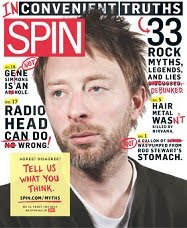
But most of these legends, if that's what they are, are debunked. Assuming Enquiring Minds wanted to know: Zappa never ate shit on stage. Rod Stewart never had his stomach pumped owing to an excess of semen within. And Nirvana didn't kill hair metal.
Hey, wait. Hold on a second. Alright on the ixnay to the Zappa fable and OK the kibosh on the myth of Rod the Mod, but you know, I was always pretty sure that Nirvana had in fact done the foulest of deeds upon that foulest of genres.
**********OK, I had no idea, but people regularly
buy and sell Nirvana 45's for thousands of dollars. This "Love Buzz" thing, who would've thunk it? I remember seeing that single at Y & T's records, picking it up and considering it, along with other Sub Pop Singles Club offerings like those from Horton Heat, the Dwarves and Fugazi. Looks like I even bought the Das Damen and Dinosaur Jr. ones. But I passed on "Love Buzz," although having seen and considered the first Nirvana single was one of the main reasons I ended up buying the first Nirvana LP.

Which did me alright. I remember driving around in the Sloshmobile on 163rd Street and playing "Negative Creep" really loudly (as the Sloshmobile's stereo
always insisted) for Cerveza. He was impressed;
* so was I. There would be more, but the first Nirvana song I ever loved was "Negative Creep." What was good besides the very very heavy rhythmic groove is that it was about having to do deal with the assholes at
the Herald, having to deal with the assholes at school, and it could have been about dealing with seven years of ubiquitous hair metal, "this is getting to me, this is getting to me" and "this is out of my reach, this is out of my reach." Of course there is a also a somewhat disturbing kind of vibe going on that would be revisited with greater attention paid in "Polly," but I'm not going there now, because we all know Kurt was a feminist, right?
**********Allen Hart and I were true metalhead buddies. Big Slayer fans, the two of us, into Overkill, Anthrax, Megadeth, Sepultura, the whole canon. We saw that weird and violent Nuclear Assault show at the danceteria that time, and we saw the Headbanger's Ball tour with Metallica and Exodus. And Allen was there at the Pantera show in West Palm Beach when that fucking skinhead coldcocked me, covering my face in blood and degrading the vision in my left eye for the rest of my life.
And you know, as I think back to that, I don't want to be naive, because people have been getting their asses kicked at rock concerts since they've been having them, but I don't think that Poison's security people, or Dokken's security people, had to spend too much time worrying about the behavior of their fans' skinhead contingent . . . .
Anyway, Allen's musical taste was a big influence on me. In college my musical tastes had taken a turn towards the punk, and towards the postpunk, but now in the late '80's, college was starting to look like it might not work out, I was working steadily for Allen delivering
The Herald, and my musical lunchwagon was about to take a detour into decidedly metallic territory.

And not towards that stuff performed by the fools with the teased hair, either: both Allen and I had a harsh opinion of glam metal, and a rude name for its practitioners. It was lame and BOE-RING, and they were "glam-fag posers."
OK. Looking back, I realize that given the tour stories, and all the porn stars they supposedly dated, it's unlikely that any of those hair metal guys were homosexual, or even bi. And I might now even go so far as to suggest that I personally preferred my metal to stay away from fucking as subject matter because I wasn't doing any of it myself.
It had been traumatic enough to be virginal in high school, when I had plenty of company in that particular misery. But here I'd managed to run through five or six years of college without getting laid, either, and I HAD to be the only one on that score.
The very last thing I needed to be confronted with was a male image so confident in his masculinity, so confident in his ability to meet, greet, socialize, bed and ultimately fuck the opposite sex, that even
wearing lipstick caused no problems with the imago.
Yes, I was born to rock, and heavy is better than mellow, but why my deep twenty-something hatred for the power ballad, anyway? Could it have been that chicks dug it? Could it have been my own inability to relate to women?
This just in: MAYBE SO.
**********I can still remember where I was when I first heard "Smells Like Teen Spirit:" stuck in morning traffic, in Dallas, Texas. As best I can figure, it was September 26, 1991, or two days after
Nevermind got its US release. Rick and Mike and I were on a road trip. We'd seen my beloved Houston Astros play (and lose)
a game at the Astrodome the night before, then had left the hotel in Houston before dawn in an effort to beat traffic.
Which hadn't worked. If you've ever been to Dallas, you'll know that the Big D does traffic about as brutally as any city in the nation. So: the three of us are cooped up in our rental Oldsmobile Silhouette, stuck in Lone Star traffic hell, restless not only from the road trip but from the 7-11 coffee, too. I bet you I had to piss. So, trying to pass the time, we turn the radio on. I can't tell you what the call letters were of the station we'd found, but I can say that it was a commercial station, and that their between song spots trumpeted how they were "Dallas' alternative" or something like that.
I remember thinking that was a funny thing to say, and then I remember hearing "Smells Like Teen Spirit."

Now, it was Chuck Eddy who penned the piece in this month's
Spin about Nirvana not having killed hair metal. With Eddy, the thing is, he's always saying the most ridiculous things, he does it on purpose I'm sure. Like when he wrote in
Stairway to Hell that the Jimmy Castor Bunch had recorded the tenth-best heavy metal record in history, or that Debbie Gibson's music is better than that of my main men die kreuzen. Or that (and I'm gonna make this one up, but I guarantee you won't be able to tell it's not authentic Eddy) L'Trimm get jiggier with the language than Pavement. It's all ridiculous, all craziness, all contrarian nonsense spewed simply for the waves it makes, but the thing is, the way he puts it together, it's so entertaining that it doesn't even fucking matter whether it's true or not. So, asks Chuck Eddy, so, asks
Spin magazine: did Nirvana truly assassinate glam metal?

Fuck, I don't know. I sure
thought they had. Eddy's reasoning seems specious on the surface, but is typically hard to disprove. He says that "Cinderella's 1990
Heartbreak Station was a purist blues-rock record" and that "Skid Row's
Slave to the Grind, out in June 1991, was pop-shunning arena turbulence." How do you go after that?
Cinderella's 1990 record might very well have had a bluesy sound. I haven't heard it. But even if it had, it can't ameliorate the sad reality that Poison went to # 2 with
their record the same year. And I'll bet licorice to Les Pauls that Poison
never made no "blues purist" album. With the Skid Row thing, whafuh? Eddy tells us that a hair metal band went to number one the same year Nirvana came out in order to prove that the genre was already dead? what's up with that? I suppose if I wanted to find out where old
Billboard charts are kept online, and if I then wanted to trawl them for hours on end, searching for data about bands I've already told you
I don't even like, I could come up with the sales data needed to disprove Mr. Eddy.
But I don't wanna do those things. So let's leave it, maybe Eddy's right, maybe he's not. I don't know. But here is one thing I do know, 'cause I was there: when that Dallas radio station played "Smells Like Teen Spirit," my immediate, visceral reaction was: holy shit.
As in, holy shit, this changes everything. In 1991, I had spent basically the previous six years listening to music that--mostly because the safe melodic template of hair metal brooked little if no dissent--absolutely, positively was not played on commercial radio. A lot of it wasn't even played on college radio, and Miami actually had a pretty good college station in WVUM.

When the cassette player in Allen's truck was on the fritz because he'd spilled Pepsi in it yet again, and his latest Overkill or Sepultura tape was thus unavailable for play, we
never listened to FM radio, preferring to listen to overnight sports talk as we delivered the morning's newspaper instead.
It was an oppressive thing there, for seven fucking years of my life: knowing that whenever you turned on the radio, it was sure to be playing something you actively hated. And while that morning in Dallas, "Smells Like Teen Spirit" was new to me, I knew the band and I knew the sound, and I liked them both.
And they were on the radio. Sure, it was on the radio
in Dallas, but I figured even if there was no such thing as "Miami's alternative" back home--and at the least there wasn't commercially--I knew that sooner rather than later, this sea change would make its way even to backward-leaning South Florida.
All this occurred to me in the first few minutes after I heard that song, on that radio, in that Oldsmobile, on that trip, with those people, at that time, on the cusp, at the beginning of the decade that would finally see me grow the fuck up. I'm not usually prescient about most things: the candidate I vote for almost always loses, if you know what I'm saying. But I had it right about the coming wave represented by Nirvana specifically, and grunge in general, back on that day in Texas traffic. It felt revolutionary, but even more, it simply felt like it was about fucking time.
The stations in Miami were playing Soundgarden and Alice in Chains within the half-year, and a period was ushered in where I felt that the commercial rock stations were both heavier and better than the college one. Weird and wondrous times, when the radio people had no idea what the fuck was going on, and--until a new template was formed--just about any band able to write a heavy yet melodic tune that didn't use the word fuck--or wear eyeliner--had a shot at getting played on pay radio.
**********
The best tune after "Going Back to Cali" on the landmark "Less Than Zero" soundtrack was Slayer's cover of "In-A-Gadda-Da-Vida." I'll always remember this interview with Tom Araya shortly after that song's release where he told the interviewer that he'd not been really able to square up with "in-A-Gadda-Da-Vida" because he'd always had problems singing songs that had the word "love" in them.
And I knew what he meant.
I remember in elementary school, third grade, maybe fourth, the music teacher played this Name That Tune kinda of thing. He'd tap 10 or 15 notes out on the bells, and the class would have to write down what song it was. So he played that horrid Olivia Newton John song, "I Honestly Love You," and I found it impossible to write out the full title on my piece of paper; even though I knew the title contained the word "honestly," all I could manage to do was write first third and fourth words. And even those caused me some trouble.
What can I say? Me and Tom Araya: similarly challenged in our appreciation of the power ballad lighter salute.
**********Seems to me that Sunset Strip in the '80's might be best compared to Detroit in the 50's. Maybe the best way to understand hair metal and its tacky, over-the-top sense of style is to consider the tailfin, which of course had its own over-the-top sense of style in spades.
In each case, what began as peculiar but harmless fun, with Hanoi Rocks and
the '48 Cadillac, grew through a slavish monomania with its own peculiar design aesthetic into a frankly out of control monster, cancerous, tasteless, omnivorous.
Which is how we got both the
1959 Eldorado and the shallow awfulness that was Poison.
**********If I remember exactly where I was when I first heard the first single from the second Nirvana album, I have no clue whatsoever when I heard the second Dokken album. In trying to remember back as I was considering this post, I was sure that I was listening to Dokken in high school, when I was hanging out in the halls with equal-opportunity guitarist types like Mike Pancier or Tony Gonzalez, and they were talking about listening to Jeff Beck, John McLaughlin and Al DiMeola--as well as to Yngwie Malmsteen, Randy Rhoads and George Lynch.
But that can't be right: I see now that
Tooth and Nail was released in September of '84--a year after I graduated high school, even given the summer school I had to do because I failed Physics.
But even if the circumstances of my introduction to the album have gone hazy, my subsequent issues with hair metal cannot color the impressions of
Tooth and Nail that have stayed with me. George Lynch was--as Mike and Tony both knew--a tremendous guitarist, who could do the flashy hammer-ons required in the wake of Eddie Van Halen, who could shred with the best of them, but also had a melodic tastefulness lacking in some of his cohorts.

But while
T&N's disappointing and even glammier follow up,
Under Lock and Key would have the softer, ear candy production heard on Warrant records,
Tooth and Nail definitely still had some balls to it. It's not drenched in top end, like a lot of the hair metal was, or even like some of the speedmetal albums of its time. As I listen to it again now, for the first time in a while, it's a decent listen. Its limitations are more the product of the 25 years that have passed than anything intrinsic to the recording.
So I guess, after all this handwringing, after going on for thousands of words about my anathema, justified or not, for glam metal,
Tooth and Nail is the one hair metal album I'll cop to having liked. "When Heaven Comes Down" is a glam metal song that can be described the way that other metal is: it's fucking
heavy. While not quite as insistent or as fast or as insane as the rhythm in "Negative Creep," the backing guitar in "When Heaven Comes Down" has nothing to be ashamed of. Definitely headbangable, which, when you get down to it, is the best thing I could say about "Negative Creep." anyway. Mick Brown's drums are, again, not as fast or as whacko as Dave Grohl's, but they play off the snare of all things, amd they are crisp, without the double bass excess you always heard from a metal drummer not good enough to handle the huge kit he's bought with his share of the advance. And needless to say, George Lynch can handle a whammy bar like Kurt never could.
Of course, that the Dokken of this era were almost restrained in the dollops of hair metal fashion used, made it easier for me then to pick it up, and makes it easier for me now, as I write what passes for an appreciation.
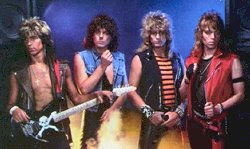
In the promo photo, (also the back cover of the album) they're all wearing leather, and bassist Pilson especially looks Hair Metal Central Casting with his armband and red leatherette accessories. But George Lynch's hair is more spiked than teased, and no-one appears to be wearing lipstick, or fishnets. Pretty mild, actually. I guess Dokken circa
Tooth and Nail were more of
a '54 Cadillac than a '59.
Dude.
Dokken - Tooth And Nail - 6 - When Heaven Comes Down.mp3
This file was removed May 22, 2010. If you're still way interested in coming up with a copy of this--and really can't figure out where you might get one--drop me an email and I'm sure I'll be able to figure something out for you.
File under: My apologies to the spirit of hair metal
Nirvana - Bleach 07 - Negative Creep.mp3
This file was removed May 22, 2010. If you're still way interested in coming up with a copy of this--and really can't figure out where you might get one--drop me an email and I'm sure I'll be able to figure something out for you.
File under: Daddy's Little Girl Songs
*Though Cerveza would later come to feel about Nirvana like I feel about Denis Johnson--that there was something within which devalued what was good about living. Nirvana never bothered me in that way, though, and I guess Denis Johnson never bothered him.
(Return)

 The clip was ubiquitous in the early days of MTV, not only in its heavy rotation on the music channel itself, but on other channels as well, as the media giants sought to copy the new and outrageous template that MTV had so suddenly provided.
The clip was ubiquitous in the early days of MTV, not only in its heavy rotation on the music channel itself, but on other channels as well, as the media giants sought to copy the new and outrageous template that MTV had so suddenly provided. 



 But I like givin' gifts and gettin' gifts and I like pretty colored lights, so nobody call me a Scrooge, OK? I'll even cop to having a Christmas tree in my living room. We always insist on the Fraser firs, and like 'em around five foot high.
But I like givin' gifts and gettin' gifts and I like pretty colored lights, so nobody call me a Scrooge, OK? I'll even cop to having a Christmas tree in my living room. We always insist on the Fraser firs, and like 'em around five foot high.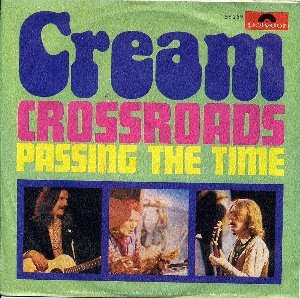
 The song is credited to drummer Ginger Baker and to Mike Taylor, and it is to be supposed that Baker handled much of the lyrics, while Taylor handled most of the music. Taylor--a pianist--had played with Baker in trad jazz bands in the early '60's, and had, by the time Wheels of Fire was released in 1968, put out two albums of his own that had become semi-legendary in the annals of British jazz.
The song is credited to drummer Ginger Baker and to Mike Taylor, and it is to be supposed that Baker handled much of the lyrics, while Taylor handled most of the music. Taylor--a pianist--had played with Baker in trad jazz bands in the early '60's, and had, by the time Wheels of Fire was released in 1968, put out two albums of his own that had become semi-legendary in the annals of British jazz. 





 So then, here we are: I'm hanging out with Howlin' Pelle Almqvist at this bar I've dredged up from my memories. It's in New Orleans (or it was), and it has (or had) plenty of smooth, clean tables, and featured the fuckin' Misfits on their jukebox, how 'bout that?
So then, here we are: I'm hanging out with Howlin' Pelle Almqvist at this bar I've dredged up from my memories. It's in New Orleans (or it was), and it has (or had) plenty of smooth, clean tables, and featured the fuckin' Misfits on their jukebox, how 'bout that?  So yeah, Almqvist and I are shooting pool. Since it's my world, and since it's New Orleans, I'm drinking Blackened Voodoo lager. The Hives' frontman is drinking Jameson's with Bass ale chasers. He's wearing black slacks, a black vest and a black shirt with red trim. A red cravat is tied aound his neck. I think to myself that he's got to be just about parboiled in there. His hair, now sweatslick, is parted at the side and combed over. His pupils are tiny, and he's frantic from one moment to the next. He calls nine ball in the side pocket, and I shake my head, mutter to myself, "tough shot."
So yeah, Almqvist and I are shooting pool. Since it's my world, and since it's New Orleans, I'm drinking Blackened Voodoo lager. The Hives' frontman is drinking Jameson's with Bass ale chasers. He's wearing black slacks, a black vest and a black shirt with red trim. A red cravat is tied aound his neck. I think to myself that he's got to be just about parboiled in there. His hair, now sweatslick, is parted at the side and combed over. His pupils are tiny, and he's frantic from one moment to the next. He calls nine ball in the side pocket, and I shake my head, mutter to myself, "tough shot." "Ahh," he replies, "but did you buy The Black and Blue Album?"
"Ahh," he replies, "but did you buy The Black and Blue Album?" Well, well, well. "Sure, the Beatles. But really," I say thoughtfully, or at least hoping a thought will come, "when I think of the Hives, I'm reminded of The Sonics. Talk about a singer who could howl. Everybody covers the Sonics, but I think only the Hives could bring something additional to 'Cinderella.'"
Well, well, well. "Sure, the Beatles. But really," I say thoughtfully, or at least hoping a thought will come, "when I think of the Hives, I'm reminded of The Sonics. Talk about a singer who could howl. Everybody covers the Sonics, but I think only the Hives could bring something additional to 'Cinderella.'"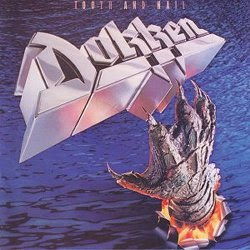
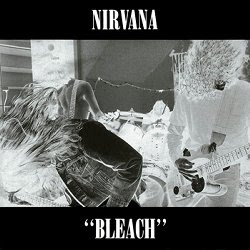
 And if I can still remember a time when a perennial like die Kreuzen's October File was the latest hype in its pages, well, who could fault me if I choose to associate myself with a reminder of those times?
And if I can still remember a time when a perennial like die Kreuzen's October File was the latest hype in its pages, well, who could fault me if I choose to associate myself with a reminder of those times?

 And not towards that stuff performed by the fools with the teased hair, either: both Allen and I had a harsh opinion of glam metal, and a rude name for its practitioners. It was lame and BOE-RING, and they were "glam-fag posers."
And not towards that stuff performed by the fools with the teased hair, either: both Allen and I had a harsh opinion of glam metal, and a rude name for its practitioners. It was lame and BOE-RING, and they were "glam-fag posers." 


 The best tune after "Going Back to Cali" on the landmark "Less Than Zero" soundtrack was Slayer's cover of "In-A-Gadda-Da-Vida." I'll always remember this interview with Tom Araya shortly after that song's release where he told the interviewer that he'd not been really able to square up with "in-A-Gadda-Da-Vida" because he'd always had problems singing songs that had the word "love" in them.
The best tune after "Going Back to Cali" on the landmark "Less Than Zero" soundtrack was Slayer's cover of "In-A-Gadda-Da-Vida." I'll always remember this interview with Tom Araya shortly after that song's release where he told the interviewer that he'd not been really able to square up with "in-A-Gadda-Da-Vida" because he'd always had problems singing songs that had the word "love" in them. But while T&N's disappointing and even glammier follow up, Under Lock and Key would have the softer, ear candy production heard on Warrant records, Tooth and Nail definitely still had some balls to it. It's not drenched in top end, like a lot of the hair metal was, or even like some of the speedmetal albums of its time. As I listen to it again now, for the first time in a while, it's a decent listen. Its limitations are more the product of the 25 years that have passed than anything intrinsic to the recording.
But while T&N's disappointing and even glammier follow up, Under Lock and Key would have the softer, ear candy production heard on Warrant records, Tooth and Nail definitely still had some balls to it. It's not drenched in top end, like a lot of the hair metal was, or even like some of the speedmetal albums of its time. As I listen to it again now, for the first time in a while, it's a decent listen. Its limitations are more the product of the 25 years that have passed than anything intrinsic to the recording. 












